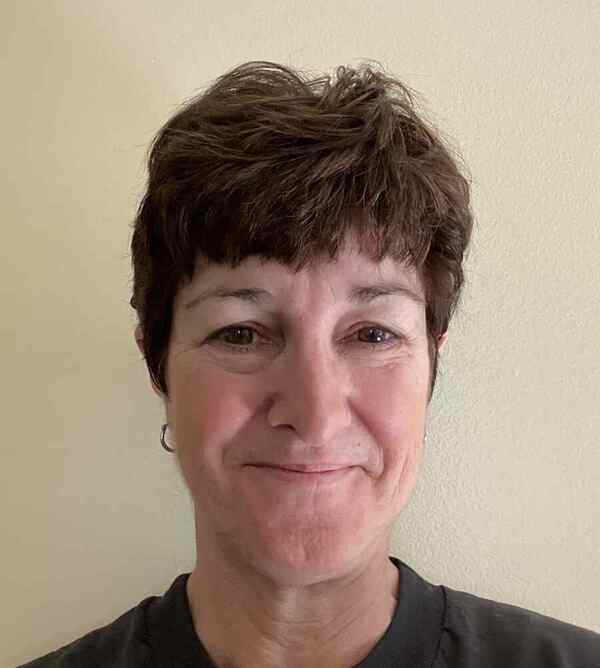Welcome back to our employee spotlight series, where we highlight the exceptional talents within ASEC. Today, we are thrilled to introduce you to Elizabeth Frey, an Integration and Test Senior Analyst.

Liz’s career in the UAV (Unmanned Aerial Vehicles) domain has been nothing short of phenomenal, and her wealth of experience brings immense value to our organization. In our chat, Elizabeth shared insights into her work now and the challenges she’s tackling at ASEC, as well as the path that led her to where she is today.
Liz’s story is a testament to the opportunities for both career transitions and a long-term growth mindset, and we’re excited to present it to you now.
What is your role at ASEC?
Integration and Test Senior Analyst at ASEC is the official title. I do support primarily the ground station portion, but I get pulled to support the air side of things as well for the various software that goes on it.
What is involved in a regular day or a regular week?
One of the interesting parts of my job is that most of it is irregular. Many times I’m used as a grease or glue type of person where an issue pops up and it doesn’t fall under any particular role that’s already in existence or they need something done quickly with a high level of rigor and detail, and I can do it.
Having been in the UAV world at Triton since 2014, I have a lot of experience in what’s going on and how things have gotten to where they’re at. They can plop me in and they know that I will run it to fruition.
You started your career in education. What was it that led toward your career switch?
It’s a crazy story! I was starting to work on my PhD in education. I already had bachelor’s and master’s degrees, so the next step for someone who is growth motivated would be to get a PhD, especially for teaching.
I’m old enough that I did my original master’s degree on a manual typewriter. I signed up for some classes and a friend said I would need a word processor, as in, an actual computer, and I didn’t know anything about that.
I went to a local computer store and got a 286 computer with a huge tower, keyboard, and mouse. I had to go back to the store often to ask questions about stuff that didn’t make sense to me.
It got to the point that the shop owner said, “if you come in here one more time you’re going to have to work here!”
The next thing I knew, he was paying me! I started in the shipping room where I was unpacking boxes, marking motherboards and CPUs, then putting them on the shelf. Before long, I was doing installs on local military bases!
After a certain point I decided to obtain the Microsoft and Cisco certifications. After receiving those certifications I went back to college and took the classes that made up an information systems master’s degree.
What was the decision like to switch over to ASEC? Was it for a specific job?
I started working in the UAV community in 2014. I had been in the helicopter world doing information technology and cyber security.
They started separating the roles so that they could keep track and make sure that there was no one role that knew everything, because that would be a huge insider threat.
That’s when I decided maybe I just want to do something different with this IT background. I ended up looking at IT engineering.
I had been working with employees from ASEC for the entire time that I was there. Finally, one of the ASEC Program Managers said, “Liz, this is crazy, you work with us closely all the time, we know what your skill set is, and you’re well received by the government customer – we really need you and would like to bring you over to our team.”
That must have been gratifying just to have this career path where you’ve kind of grown your own skills and then to get recognized by a company like ASEC and hired on board.
Absolutely. And the process was very, very easy. When I arrived at work, people were waiting for me in the lobby. It was nice that the receptionist knew my name and who I was coming to see. It was a very warm and refreshing entrance into ASEC.
One of the appeals to working at ASEC is that they care about their people.
I was taken to lunch by one of the executives. He sat and talked with me and wanted to know more about how I felt about things. He just wanted to get to know me as a person.
What motivates you about the kind of work that ASEC is involved with?
We are working for the Navy, we work with national security. There are always things that need to be taken care of from a bigger picture for our country that people forget about. Working with contractors and working with ASEC specifically, everybody at ASEC has ties to the military.
The majority of ASEC employees have military experience. Other employees have spouses that have been in the military and understand what our goals are and what our mission is as an overall industry working to keep America safe and free.
Having like-minded individuals to work with and to share those goals with is important because we share that dedication to go the extra mile. It’s not like when you work in an industry where you punch a clock and you leave, or that you’re only looking to make money off of something.
We have the goals of being honest and forthright and making our mission, which is working for the Navy or any other military group that we’re working for, be more efficient.
You mentioned earlier about moving to a smaller company. How does that factor into the next part of your career? Is there something you’re looking to do more of at ASEC?
There’s definitely growth within ASEC. They’re wanting me to do some management coming up here shortly. We always have new programs coming down the pike when we win contracts.
The Navy and the Marine Corps are always putting out new efforts, new weapon systems, new programs and ASEC really allows us to move from one program to another.
We’re not just a warm body that they put on a contract. We’re there for our specific skills and what we can bring to the table.
I’m happy working at the current program that I’m in, but it’s okay if things change. Whether it changes because of where we’re adding that program, maybe they’re into sustainment or they’re going to retire a program, there are always opportunities, and they know their people and their skill sets.
What are the kinds of challenges that are exciting you today with ASEC?
Time constraints. The government in general has a lot of processes that can take a long time. It’s for good reason, of course, because you have to keep things conformed. You have to know what product you’re putting out, and it has to be repeatable.
Now I’m working towards streamlining some of those. Those are some of the challenges that I work with every day. I continue to see a need for streamlining these processes to maintain that configuration control, but to also be able to recoup some of the time that gets lost in red tape.
That’s the kind of thing that I end up doing a lot. I look ahead at what’s coming down the pike as we’re deploying our products, as we’re creating our products, because I work in a software area. We have to test and make sure procedures are in place.
Then we have to look forward to the systems that are out there. How are we going to deploy them? What pitfalls might be there? And how do we do better prediction of fixes for that?
It’s making sure that we have as much detailed information and sharing.
For all of the systems that we have in the world right now where you can Twitter and tweet and you can Facebook and friend and you can email and you can do Teams, Skypes, Meets… for all of that, we still have big challenges in getting people communicating.
I will send an email and incorporate a lot of information to many people who are running three different threads on a topic and they really all need to.
How have you felt supported by ASEC to keep your skills and knowledge of the industry current?
If we need training, like if I needed an advanced Linux class, I just put in for it and they approve it and pay for it.
If we need to get the government to reimburse it, they totally have no problem reaching out to the government and making a case for it.
All of those things are available to us.
There’s a lot of government required training that they take as part of our day to day stuff.
Those are all options, but this is the first company that really has a fast turn around for allowing us to take that training.
What would you say to those people who are either considering a move to ASEC about why it could be a good place for them?
It’s a great company. They started out 20 years ago and they maintain a great sense of family. The people that they bring in to continue to grow and run the company have that same sense of commitment to the people.
Make The Move And Team Up With ASEC
We’re very appreciative to Elizabeth for taking a bit of her morning to speak with us about her career and where she’s headed with ASEC. We’re glad to be part of the journey.If you’re looking for the next challenge for your career, check out our current job opportunities here.

